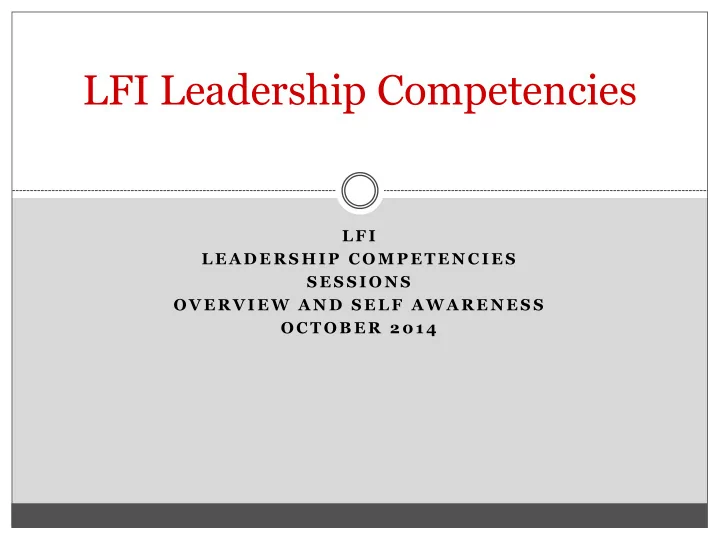

LFI Leadership Competencies L F I L E A D E R S H I P C O M P E T E N C I E S S E S S I O N S O V E R V I E W A N D S E L F A W A R E N E S S O C T O B E R 2 0 1 4
LFI Leadership Competencies Servant Leadership Leadership Presence Integrity & Authenticity Systems Awareness Active Listening & Curiosity Collaboration Situational Awareness Visionary & Inspirational October 16, 2014 Colin Callahan and Karen Cleveland
Consciousness and Competence Unconscious Unconscious Incompetence Competence Consciousness Competence Conscious Conscious Incompetence Competence Create New Behavioral Practice October 16, 2014 Colin Callahan and Karen Cleveland
Leadership Competencies Overview Servant Leadership Leader as Servant Leadership Presence Confidence and Vulnerability Integrity & Authenticity Consistency and Transparency Systems Awareness Seeing Interrelationships Active Listening & Curiosity Understanding and Openness Collaboration Sum Greater Than The Parts Situational Awareness Drawing The Best From All Resources Articulating a Common Goal Visionary & Inspirational Moving People Towards It October 16, 2014 Colin Callahan and Karen Cleveland
Neuro-Plasticity Reveals a Chemistry of Habit Neuro- plasticity refers to the brain’s ability to change Research shows that we are never too old to change, that we can rewire our brain to think and act in new ways Habits involve the entire body Intellectual Emotional Physical Our thoughts affect our cells’ behavior October 16, 2014 Colin Callahan and Karen Cleveland
Self-Directed Neuro-Plasticity Sounds fancy but it’s just Building Self-Awareness Cultivating your ability to observe yourself as a detached observer Notice what you are thinking and feeling and how each are feeding off each other in any given moment You can only make new and more constructive choices when you are conscious of the ones you are making now And recognize them as a choice October 16, 2014 Colin Callahan and Karen Cleveland
Revisiting Crossing the Line Take a moment to reflect on the Crossing the Line exercise from the opening retreat Write down some thoughts to these questions: What did you learn from that exercise? What stuck with you during the last month? What have you noticed about your perspectives since that exercise? Pair up with someone at your table Discuss your observations October 16, 2014 Colin Callahan and Karen Cleveland
Ladder of Inference Video Video (6 mins)- Rethinking thinking - Trevor Maber Additional Reading - Humility in Leadership: Five Steps for Overcoming Our Leadership Biases Society for Organizational Learning - The Ladder of Inference Journal Question – What are some situations that cause your bias or belief to takeover? October 16, 2014 Colin Callahan and Karen Cleveland
Ladder of Inference The Ladder of Inference is a model that describes how we process data, develop beliefs, and make decisions . From millions of external of inputs (life), we Select Data and Apply Meaning Make Assumptions and Draw Conclusions Adopt Beliefs and Take Action based on Conclusions and Beliefs The Reflexive Loop affects the Data we select We tend to select data that support our beliefs - and ignore data that contradicts our beliefs We do this in an instant and act accordingly Colin Callahan and Karen Cleveland October 16, 2014
Rewiring Your Thinking Thought Physical Manifestation Everything begins with a thought. How is what you are thinking Change the way you think to get and feeling showing up for you your desired result. physically? Desired Results Feelings/Emotion When you feel a strong emotion, ask yourself, “What am I thinking?” October 16, 2014 Colin Callahan and Karen Cleveland
Perspectives What are some perspective you hold that may be holding you back? What patterns of belief keep getting in your way? October 16, 2014 Colin Callahan and Karen Cleveland
The Dunning-Kruger Effect Refers to a study by David Dunning and Justin Kruger about self- evaluation Poor performers tend to self-assess that they have performed very well In order to accurately assess your competency in a skill you need to be competent enough about the skill to assess the quality and Original Study Hypotheses: gradations of the skill 1.) Incompetent people tend to overestimate Example : American Idol their skill level Auditions – the poor singers are so 2.) They also fail to recognize actual skill in inexpert about singing that they others 3.) And, they are poor at seeing how extreme cannot judge nor see how badly their incompetence is they sing 4.) If the get training, they will admit they were unskilled October 16, 2014 Colin Callahan and Karen Cleveland
Implications of Dunning-Krueger Reading How Difficulties In Recognizing One's Own Incompetence Leads To Inflated Self-assessment Flawed Self-Evaluations: David Dunning's Fascinating Work Revisiting Why Incompetents Thing They're Awesome The Dunning-Kruger Effect Journal Questions - Where has the DK effect shown up in your career or leadership style? What can you do to counteract the DK effect in your leadership style? What does this mean for us regarding self-awareness and leadership development? October 16, 2014 Colin Callahan and Karen Cleveland
Some Steps To Build Self-Awareness STOP - what you are doing. Notice your thoughts and how they are making you feel OBSERVE - what are you thinking that makes you feel the way you do? ASK what valuable lesson does this situation have to teach you? Be curious about your reaction REFRAME your thoughts are not reality. Thoughts are just how your brain is processing it. What’s another perspective? October 16, 2014 Colin Callahan and Karen Cleveland
Who Am I? Think Again Video (9 mins) – Ted Talk - Hetain Patel Journal Questions - Who have you imitated in your life? (Who did you want to be like as a kid?) What assumptions are you trying to keep people from making about you? October 16, 2014 Colin Callahan and Karen Cleveland
Recommend
More recommend